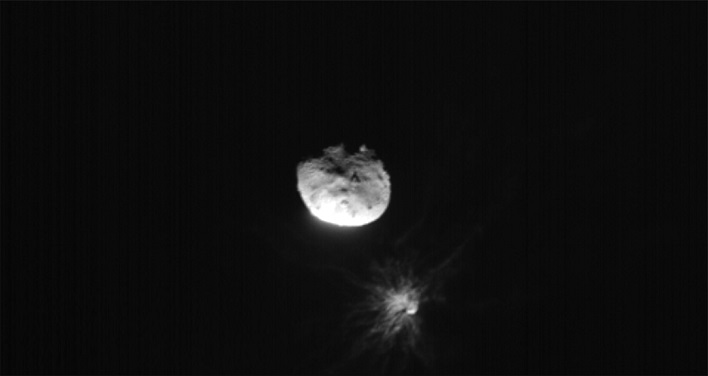NASA's Double Asteroid Redirection Test, referred to as DART, spacecraft was traveling at approximately 14,000mph (22,530km/h) when it impacted in September of 2022. Following the impact, scientists estimated that it displaced more than one million kilograms (two million pounds) of dust from the space rock into space. The test was to see how an asteroid would react to an impact from a spacecraft in hopes of being able to deter a doomsday event in the future. However, that test has seemingly affected Dimorphous in a way that can yet be explained.

One possible explanation that has been suggested is that since the debris cloud was so immense and changed over some time, it could have influenced the orbit of Dimorphous. A different research team followed the debris cloud closely following the collision for about a month, determining that as the cloud of space dust and rock expanded outward, new structures began forming, such as clumps, spirals, and a long tail pushed away by the Sun's radiation. However, The latest research team doesn't believe this is causing the slowdown of the asteroid's orbital path.
While the asteroid's orbital path had already been determined to be slowing down before the impact, the researchers say it would still not account for the amount of change that is currently happening. The team wrote, "Therefore, whatever effect was causing the orbital decay before the collision cannot account for the discrepancy we observe; this includes the binary YORP effect, mutual tides, differential Yarkovsky force, nodal precession, and mass loss."
Regardless of what is causing the continued slowdown in Dimorphous' orbital period, it is a cause for concern. Some theories suggest that the impact may have even "tumbled" the asteroid's orbit or possibly unlocked it from Didymos' tidal forces. Jonathon Swift, a lead researcher of the new results, remarked in an interview with New Scientist, "We tried our best to find a crack in what we had done, but we couldn't find anything."
https://news.google.com/rss/articles/CBMiSGh0dHBzOi8vaG90aGFyZHdhcmUuY29tL25ld3MvYXN0ZXJvaWQtbmFzYS1zbWFzaGVkLWludG8tb3JiaXRpbmctd2VpcmRsedIBTGh0dHBzOi8vYW1wLmhvdGhhcmR3YXJlLmNvbS9uZXdzL2FzdGVyb2lkLW5hc2Etc21hc2hlZC1pbnRvLW9yYml0aW5nLXdlaXJkbHk?oc=5
2023-09-09 16:35:00Z
2412661748
Tidak ada komentar:
Posting Komentar